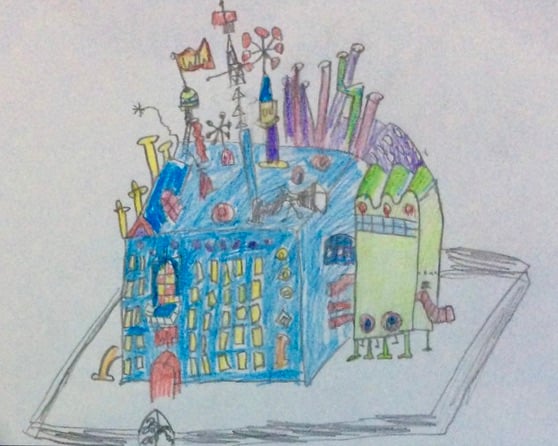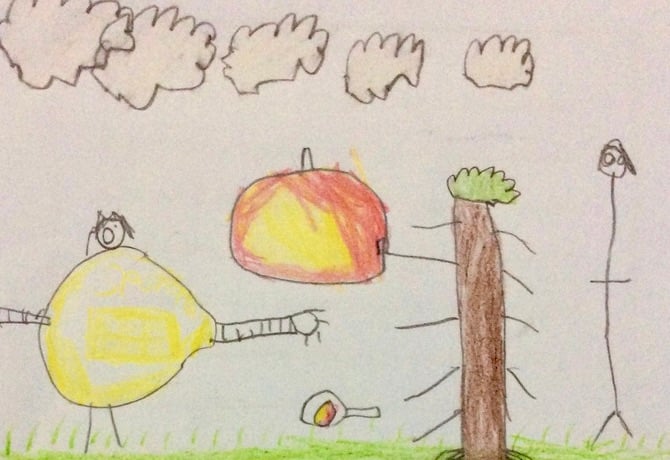Roald Dahl is one of the world's most famous and beloved authors whose stories brim with magic, mischief and mayhem. His books are used as inspiration for writing lessons in classrooms around the world. If you’re looking for fresh ideas to bring the magic of Roald Dahl into your pupils writing we can help. On Pobble you’ll find thousands of teaching ideas to help with your lesson planning.
Here are a few of our favourite Roald Dahl writing ideas to try in your class:
Dream writing 💡
What would your class put inside the BFGs jar? What goes into an incredible Phizzwizard or a terrible Trogglehumper? Creating dreams (good or bad) is great for generating adventurous vocabulary. See an example on Pobble.
Wanted! 💡
Which of Roald Dahl's villains will your class write a wanted poster for? The Grand High Witch? Miss Trunchbull? Or Mr Wormwood perhaps? Wanted posters are a great way of writing in a fun format and an opportunity to include lots of interesting similes. Here’s an example of a Mr Twit wanted poster.
Narrative poems 💡
The Oompa Loompas are known for their catchy songs containing words of advice. A great basis for a lesson on narrative poetry:
“In class we looked at the narrative poems sung by the Oompa Loompas. Using a character from Roald Dahl's hidden Charlie and the Chocolate Factory chapters, the girls worked in groups to produce their own verses for a narrative poem. The lines had to have 8 syllables and verses were made up of rhyming couplets.”
Have a read of an example.
Cracking characters 💡
When it comes to wonderful Roald Dahl characters there are almost too many to choose from. His characters offer an abundance of writing ideas. Use Dahl’s characters as a basis for writing character profiles, or character descriptions using figurative language. Alternatively, your class could create their own characters inspired by Roald Dahl’s crazy and colourful creations. Search character descriptions on Pobble.
 ‘Innovating’ Dahl’s stories 💡
‘Innovating’ Dahl’s stories 💡
Would your pupils change or adapt any of Dahl’s stories? Can they innovate a section and make the story their own? Here’s an example.
Sweet creations 💡
Willy Wonka is renowned for his incredible sweet creations. Can your class create their own? They could plan, design and describe a brand new chocolate bar or sweet!
“We started off by thinking about how a characters' name can influence their looks, personality and behaviour. We then moved onto looking at creating sweets/chocolate bars inspired by the wondrous world of Willy Wonka. The children presented their weird and wonderful creations to the class.”
See an example here.
Roald Dahl biographies 💡
Who was the man behind the books? What got him into writing and how did he become an author? Get your class researching and writing a biography of the great author. His story may just encourage your young writers to pick up their pencils more often. There are lots of examples of biographies written by children on Pobble, search ‘Roald Dahl biography’ to see examples.
Points of perspective 💡
It’s common to write from the perspective of the protagonist, but what about the lesser known characters? How did Bruce Bogtrotter feel about his time at school with Matilda, or Grandpa Joe about his visit to the Chocolate factory? Here’s an example.
Postcards 💡
Pick a character from a Dahl story and ask the children to write a postcard from their perspective. Where are they sending the postcard from, what’s happening on their adventure?
“The children became either James or Charlie and wrote a postcard or letter to the other, telling them all about their respective adventures; James in the peach and Charlie to Willy Wonka’s factory.”
See an example.
Reviews 💡
We all have our favourite books from Roald Dahl’s extensive collection. There are heaps of book reviews on Pobble and plenty based on Dahl’s works. Not only will writing book reviews help children demonstrate a deeper understanding of a text they also give you the opportunity to understand the children’s comprehension of the stories they read. Search 'book reviews' on Pobble to see lots of examples.

Letters to the man himself 💡
What would your pupils say to Dahl if he was still with us? Would they thank him for the stories, ask him a question or share their favourite quotes? Writing a letter to Dahl is a great way to share their thoughts on the great man's books, but also develop their letter writing skills. See an example here.
Word inventions 💡
Did you know Dahl invented over 500 words? As a quick writing warm-up your class could have a go at making up their own words. How many can they invent? For a longer piece of writing, they could include their inventions in a story or poem!
Marvellous medicines and revolting recipes 💡
Dahl’s books are perfect for teaching instructions. Your class could describe how to make fresh mud burgers, Willy Wonka’s Nutty Crunch Surprise or even Bird Pie. Alternatively, they could create their own perilous potion.
"As part of our English work looking at Roald Dahl's The Twits, we have created our own recipes for Twit Soup - a delightfully disgusting soup to feed to Mr Twit so he wont play any more pranks on his wife!”
Have a read of an example.
Practical jokers 💡
Roald Dahl believed it was essential to make children laugh. His stories are full of horrid pranks and funny tricks. Can your class come up with a funny joke in the style of Roald Dahl and write about it? Here’s a fun example.
Still looking for more ideas?
Search ‘Roald Dahl’ in our ginormous bank of children’s writing on Pobble to discover more ideas or find a piece of writing to share as a WAGOLL or exemplar.
Pobble Education Ltd,
Rosehay,
Tremorvah Wood Lane,
Truro, TR1 1PZ,
Cornwall, UK